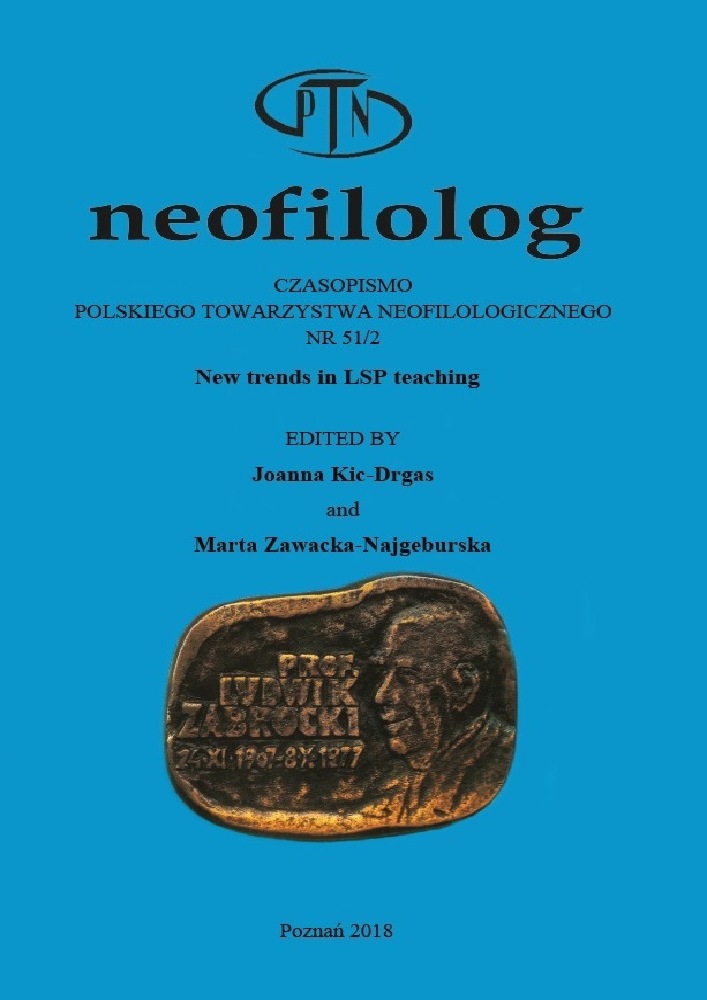Résumé
Designing English for Specific Purposes (ESP) courses is a challenging task. The teacher often has to cope with time constraints, shortage of resources as well as his or her insufficient knowledge of a given field of study. Students enrolled in a course are often consulted about the source of materials for instruction. The process of developing ESP tasks can be made easier and less time-consuming by means of employing student-generated communication activities which draw on learner-based approaches to teaching. The paper contains a collection of student-generated tasks that can be successfully used at the preparatory, follow-up or main stage of an ESP class. In the author’s teaching context on numerous occasions they have triggered lively exchanges between students: discussion, brainstorming, or negotiation. Student-generated activities naturally develop collaboration and autonomy, which are essential in the workplace environment. Just like communication skills, they have to be taught explicitly due to the fact that in the area of soft skills there exist considerable differences at the personal and culture-specific level. Finally, since students’ specialist knowledge is usually much better than that of the teacher, student-generated activities tend to be to the point, up-to date, or more precise with respect to the course objectives.
Références
Anthony L. (2007), The teacher as student in ESP course design (in) Wykład inauguracyjny na sympozjum pod tytułem 2007 International Symposium on ESP & Its Applications in Nursing and Medical English Education. Kaohsiung. Online: http://www.laurenceanthony.net/research/20071005_06_fooyin_keynote/20071005_06_fooyin_keynote_proc.pdf [access date: 02.08.2018].
Campbell C., Kryszewska H. (1992), Learner-based teaching. Oxford: Oxford University Press.
de Chazal E., Moore J. (2013), Oxford EAP. A course in English for academic purposes. Oxford: Oxford University Press.
Deller S. (1990), Lessons from the learner. London: Longman.
Dubin F., Olshtain E. (1986), Course design. Cambridge: Cambridge University Press.
Feez S. (1998), Text-based syllabus design. Sydney: National Centre for English Language Teaching and Research.
Flowerdew L. (2013), Needs analysis and curriculum development (in) Paltrige B., Starfield S. (eds), The handbook of English for specific purposes. Chichester: John Wiley & Sons, Inc, pp 325-346.
Gajewska-Skrzypczak I., Sawicka B. (2016), Język specjalistyczny na uczelni technicznej. Refleksje nauczycieli praktyków (in) “Języki Obce w Szkole”, No 3, pp. 5.
Lai E., Dicerbo K., Foltz P. (2017), Skills for today: what we know about teaching and assessing collaboration. London: Pearson. Online: http://www.p21.org/storage/documents/Skills_For_Today_Series-Pearson/Collaboration_White_Paper_FINAL.pdf [access date: 27.03.2018].
Lindstromberg S., Boers F. (2008), Teaching chunks of language. Rum, Austria: Helbling Languages.
Maley A. Using minimal resources: using questions. Part 1. Online: http://www.onestopenglish.com/methodology/minimal-resources/skills/minimal-res ources-using-questions-part-1/146548.article [access date: 18.09.2017].
Meddings L. (2011), 20 steps to teaching unplugged. [seminar] British Council. Online: https://www.teachingenglish.org.uk/article/20-steps-teaching-un plugged [access date: 15.09.2017].
Metusalem R., Belenky D.M., DiCerbo K. (2017), Skills for today: what we know about teaching and assessing communication. London: Pearson. Online: http://www.pearsonlearningnews.com/wp-content/uploads/2018/02/communication-skills-final.pdf [access date: 27.03.2018].
Tennant A. (2017), Minimal resources: teaching vocabulary. Online: http://www.onestopenglish.com/methodology/minimal-resources/vocabulary/m inimal-resources-teaching-vocabulary/146544.article [access date: 18.09.2017].
Thornbury S. (2017), M is for manifesto. [Blog] An a-z of ELT. Online: https://scottthornbury.wordpress.com/tag/teaching-unplugged [access date: 17.09.2017].
NETOGRAPHY
https://answergarden.ch [access date: 09.10.2017]
https://bubbl.us [access date: 18.03.2018]
https://conceptboard.com [access date: 18.03.2018]
https://flask.io [access date: 23.03.2018]
https://pl.padlet.com [access date: 09.09.2017]
https://surveyplanet.com [access date: 25.03.2018]
https://todaysmeet.com [access date: 09.10.2017]
https://www.tricider.com [access date: 09.10.2017]
Licence
© Neofilolog 2018

Ce travail est disponible sous licence Creative Commons Attribution - Pas de Modification 4.0 International.
Auteurs :
Les auteurs de textes acceptés pour publication dans la revue Neofilolog sont tenus de remplir, signer et renvoyer à l'adresse de la rédaction, un accord sur l'octroi d'une licence gratuite pour les œuvres, avec obligation d'accorder une sous-licence CC.
En vertu de cet accord, les auteurs des textes publiés dans la revue Neofilolog accordent à l'Université Adam Mickiewicz de Poznań une licence non exclusive et gratuite et permettent l'utilisation de la sous-licence Creative Commons Attribution-NoDerivatives 4.0 International (CC BY-ND 4.0).
Les auteurs se réservent le droit de disposer librement de l'œuvre.
Utilisateurs :
Les utilisateurs d'Internet intéressés ont le droit d'utiliser les œuvres publiées à partir de l'année 2017 sous réserve des conditions suivantes :
- reconnaissance de la qualité d'auteur - l'obligation de fournir des informations sur la qualité d'auteur, le titre, la source (liens vers l'œuvre originale, DOI) et la licence, ainsi que l'œuvre distribuée ;
- sans créer d'œuvres dérivées - l'œuvre doit être conservée dans sa forme originale, p. ex. les traductions ou les interprétations ne peuvent être distribuées sans le consentement de l'auteur.
Tous les textes publiés sont soumis au droit d'auteur.
Autres :
L'Université Adam Mickiewicz de Poznań se réserve le droit à la revue dans son ensemble (mise en page, forme graphique, titre, conception de la couverture, logo, etc.).
.

